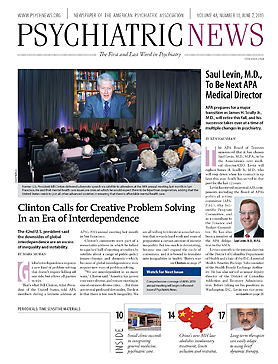China is fundamentally transforming the provision of mental health services to its citizens under a new law that took effect on May 1.
China’s first national mental health legislation, which was adopted by the Standing Committee of the National People’s Congress last October, is expected to have wide-ranging effects on the provision of mental health services.
Perhaps the most significant and controversial change in the law is one that eliminates most forms of involuntary treatment. The law also mandates strict limits on the use of seclusion and restraints and bans the use of psychiatric admission and treatment as a form of punishment for individuals who do not have a mental illness. It also forbids the practice of requiring inpatients to participate in labor and ends restrictions on their right to communicate with the outside world.
An editorial appearing online April 29 in AJP in Advance emphasizes that the move away from involuntary treatment—and other provisions in the law—presents China with many challenges, especially the need for more psychiatrists and more community-based psychiatric services.
“Traditionally, families in China are responsible for the care of disabled family members, so the decision about whether or not an individual was treated for a mental disorder, particularly if it involved inpatient treatment, was usually made by family members, not by the individual or by the treating psychiatrist,” said Michael Phillips, M.D., and colleagues in the editorial.
“As more treatment services have become available for less severe forms of mental disorders, increasing numbers of individuals have voluntarily sought outpatient services without the involvement of their families; but the majority of individuals with severe mental disorders who require inpatient treatment are still involuntarily admitted by their legal guardians, who are almost always family members. Changing that long-standing practice to a largely voluntary admission system will increase the burden on families, because they are legally responsible for the care and management of patients who are living in the community and bear civil liability for the patients’ behavior. Converting to a voluntary admission system will also greatly increase the need for community-based mental health services; these services are currently quite weak in most urban communities and absent in most rural communities.”
But the editorial also praises the law as potentially transformative. “This new law is a high-water mark for Chinese psychiatry, and potentially for global mental health,” Phillips and colleagues said.
In comments to Psychiatric News, Phillips said the new law should have global implications. “China’s experience in providing a more holistic approach to mental health problems will, hopefully, generate lessons that all countries can learn from,” he said. “The law is important to international mental health because China’s size means that it accounts for approximately one-fifth of the global burden of mental disorders. And as a large low-income country, the models for managing mental illness developed and tested in China will probably be more relevant to low- and middle-income countries, where the vast majority of individuals with mental disorders reside, than the models developed in high-income countries.”
Phillips holds joint positions at the Shanghai Mental Health Center at Shanghai Jiao Tong University in China and the departments of Psychiatry and Global Health at Emory University in Atlanta.
Phillips explained that China’s new law is much more comprehensive than those in most other countries, mandating the integration of primary prevention, rehabilitation services, and treatment services. And he said the law clearly indicates the responsibility of different stakeholders—families, work institutions, communities, governmental agencies—for combating stigma and providing services and welfare support to those with mental disorders and their families.
He added, “Like the U.S., China is struggling with finding the right balance between the care and control of the mentally ill. . . . Both China and the U.S. need to work on finding the right balance between individual freedom, family responsibility, and protection of the community. There are no absolute answers to these issues, so the U.S. and China can learn from each other as they work towards finding the solutions that best fit their respective cultural and health-care environments.” ■

